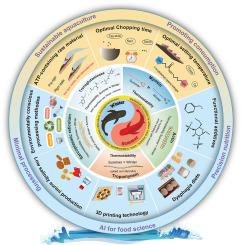Silver carp (Hypophthalmichthys molitrix) utilization: Surimi innovations based on seasonal variation in muscle proteins
IF 15.1
1区 农林科学
Q1 FOOD SCIENCE & TECHNOLOGY
引用次数: 0
Abstract
Background
Silver carp (Hypophthalmichthys molitrix) is extensively cultured across various regions and countries due to its rapid reproduction, high growth rates, and cost-effectiveness. Surimi products are globally favored for their high protein content, distinctive flavor, and convenience. As a critically important freshwater resource, silver carp's favorable processing characteristics—such as its white flesh, high protein content, and excellent gelation properties—make it an ideal choice for producing fish paste and surimi products. The quality of surimi products is largely determined by their gelation properties, which are influenced by the quality of the raw materials and the thermal stability.
Scope and approach
This review gave a comprehensive overview of silver carp surimi products and summarized the gelation mechanism focused on the seasonal variations in silver carp muscle proteins including myosin, actin, tropomyosin, sarcoplasmic reticulum Ca2+-ATPase, and endogenous transglutaminase. These properties were important for guiding surimi production and processing. Finally, the research trends and outlined future directions were highlighted.
Key findings and conclusions
Due to the seasonal variation in silver carp muscle proteins, different processing conditions are required depending on the season. The setting temperature in summer is between 35 and 40 °C, whereas in winter, it is 30 °C. Considering the extensive aquaculture of silver carp in Southeast Asia and Africa, it is crucial to identify the gelation mechanisms and optimize production techniques based on environmental conditions and freshness of sampling. Current research emphasizes low-sodium formulations, 3D food printing, dysphagia diets, functional additives, and eco-friendly processing methods.

鲢鱼(Hypophthalmichthys molitrix)的利用:基于肌肉蛋白质季节性变化的鱼糜创新
背景鲢鱼(Hypophthalmichthys molitrix)因其繁殖快、生长率高和成本效益高而在各个地区和国家广泛养殖。鱼糜产品因其蛋白质含量高、风味独特、食用方便而受到全球青睐。作为一种极其重要的淡水资源,鲢鱼具有良好的加工特性,如白色肉质、高蛋白含量和出色的凝胶特性,因此是生产鱼酱和鱼糜产品的理想选择。鱼糜产品的质量在很大程度上取决于其凝胶特性,而凝胶特性又受原材料质量和热稳定性的影响。范围和方法 本综述全面概述了鲢鱼鱼糜产品,并总结了凝胶机制,重点是鲢鱼肌肉蛋白质的季节性变化,包括肌球蛋白、肌动蛋白、肌肌球蛋白、肌浆网 Ca2+-ATP 酶和内源性转谷氨酰胺酶。这些特性对于指导鱼糜的生产和加工非常重要。最后,重点介绍了研究趋势和未来发展方向。夏季的饵料温度为 35 至 40 °C,而冬季为 30 °C。考虑到鲢鱼在东南亚和非洲的广泛养殖,根据环境条件和采样新鲜度确定凝胶化机制并优化生产技术至关重要。目前的研究重点是低钠配方、3D 食品打印、吞咽困难饮食、功能性添加剂和生态友好型加工方法。
本文章由计算机程序翻译,如有差异,请以英文原文为准。
求助全文
约1分钟内获得全文
求助全文
来源期刊

Trends in Food Science & Technology
工程技术-食品科技
CiteScore
32.50
自引率
2.60%
发文量
322
审稿时长
37 days
期刊介绍:
Trends in Food Science & Technology is a prestigious international journal that specializes in peer-reviewed articles covering the latest advancements in technology, food science, and human nutrition. It serves as a bridge between specialized primary journals and general trade magazines, providing readable and scientifically rigorous reviews and commentaries on current research developments and their potential applications in the food industry.
Unlike traditional journals, Trends in Food Science & Technology does not publish original research papers. Instead, it focuses on critical and comprehensive reviews to offer valuable insights for professionals in the field. By bringing together cutting-edge research and industry applications, this journal plays a vital role in disseminating knowledge and facilitating advancements in the food science and technology sector.
 求助内容:
求助内容: 应助结果提醒方式:
应助结果提醒方式:


